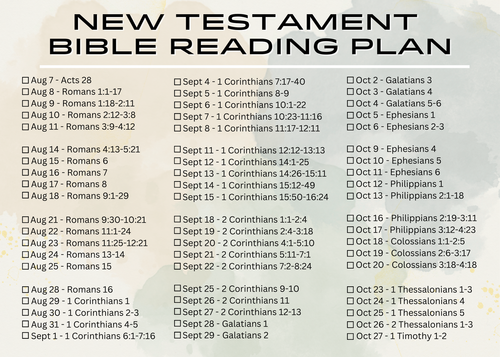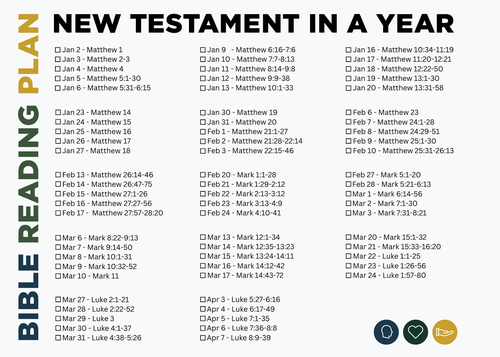The Law, Hypocrisy, And Christ As The Center
Galatians 2:1-21
It is likely that "after fourteen years" refers to Paul's ministry in Syria and Cilicia, including his initial missionary journey. The meeting Paul mentions is probably the well-known Jerusalem council. However, the focus is not on the larger gathering described by Luke but on a private meeting with the inner circle of Jerusalem's leadership: James, Cephas, and John. Paul does not mean that he needed these apostles to review and approve the gospel he had preached for the past seventeen years (or so). Instead, he intended to prevent misunderstandings and avoid the kind of interference in his missionary work that necessitated the writing of the letter to the Galatians.
Paul remained unwavering on the crucial matter of circumcision, as it held the truth of the gospel for Titus and the Galatians. Paul emphasizes that enforcing circumcision for Gentile believers would strip away our freedom and enslave us. Paul highlights the positive outcome of his encounter with the influential apostles in Jerusalem. Rather than adding anything to Paul's teachings, these influential apostles treated him as an equal and agreed on a strategy to utilize their God-given gifts effectively. James, Cephas (Peter), and John would focus on the circumcised, while Paul would focus on the uncircumcised.
During the mid-first century, the Eastern Roman Empire experienced a period of extensive famine, resulting in a significant population of the impoverished, particularly in Judea. The apostles sought to emphasize the importance of Paul and the Gentile churches he established regarding their adherence to the Scriptures' teachings on compassion for the less fortunate. In response, Paul assured them of his wholehearted dedication to this biblical imperative.
During the period described by Luke after the Jerusalem conference, when Paul and Barnabas were teaching and preaching in Antioch (Acts 15:35), Paul recounts an event. Before the arrival of the emissaries from James, Peter was not doing anything out of the ordinary by eating with Gentiles. However, he started withdrawing and distancing himself from them after their arrival. The pressure was strong enough that all the Christian Jews in Antioch, except Paul, yielded. Paul's mention of "even Barnabas" suggests disappointment and personal pain. By using the term "hypocrisy," Paul assumes that all of them, including Barnabas, knew that yielding to this pressure was wrong. Paul explicitly directs his remarks to Cephas, one of the influential apostles who had previously agreed with the "truth of the gospel" at the Jerusalem council. Cephas has influenced a significant group of people to act inconsistent with this truth.
According to Paul's argument, if God is the judge and the standard for judgment is fulfilling the requirements of the law ("works of the law"), then every Jew should recognize that God can't declare people "just" and exempt them from punishment based on this standard. Instead, seeking refuge in God's grace and mercy is necessary. Christian Jews understand that God has offered this grace and mercy through Christ's redemptive and atoning death on the cross. The distinction between Gentiles and Jews is not that one group sins and the other does not sin; instead, all sinners must find justification in Christ.
Someone who reconstructs barriers they once dismantled is a transgressor. The act of rebuilding these dietary barriers was precisely what Cephas and those he led astray in Antioch were engaged in. It is not the act of eating with fellow believers who happen to be Gentiles that makes one a transgressor. In this passage, Paul also speaks of his relationship to Christ's death as more than being rescued from the law's curse through Christ's substitutionary atonement. In some sense, he died with Christ on the cross, but this death led to a new life in which Christ became the central aspect of his existence. Now, Christ is the focal point of his life instead of the law. The life of Christ within the believer necessitates the death of any non-Christian, self-centered ways of relating to God and seeking life. If adherence to the Mosaic law or pagan religious customs could bring peace with God and life, then Christ's atoning death would be unnecessary.
Paul remained unwavering on the crucial matter of circumcision, as it held the truth of the gospel for Titus and the Galatians. Paul emphasizes that enforcing circumcision for Gentile believers would strip away our freedom and enslave us. Paul highlights the positive outcome of his encounter with the influential apostles in Jerusalem. Rather than adding anything to Paul's teachings, these influential apostles treated him as an equal and agreed on a strategy to utilize their God-given gifts effectively. James, Cephas (Peter), and John would focus on the circumcised, while Paul would focus on the uncircumcised.
During the mid-first century, the Eastern Roman Empire experienced a period of extensive famine, resulting in a significant population of the impoverished, particularly in Judea. The apostles sought to emphasize the importance of Paul and the Gentile churches he established regarding their adherence to the Scriptures' teachings on compassion for the less fortunate. In response, Paul assured them of his wholehearted dedication to this biblical imperative.
During the period described by Luke after the Jerusalem conference, when Paul and Barnabas were teaching and preaching in Antioch (Acts 15:35), Paul recounts an event. Before the arrival of the emissaries from James, Peter was not doing anything out of the ordinary by eating with Gentiles. However, he started withdrawing and distancing himself from them after their arrival. The pressure was strong enough that all the Christian Jews in Antioch, except Paul, yielded. Paul's mention of "even Barnabas" suggests disappointment and personal pain. By using the term "hypocrisy," Paul assumes that all of them, including Barnabas, knew that yielding to this pressure was wrong. Paul explicitly directs his remarks to Cephas, one of the influential apostles who had previously agreed with the "truth of the gospel" at the Jerusalem council. Cephas has influenced a significant group of people to act inconsistent with this truth.
According to Paul's argument, if God is the judge and the standard for judgment is fulfilling the requirements of the law ("works of the law"), then every Jew should recognize that God can't declare people "just" and exempt them from punishment based on this standard. Instead, seeking refuge in God's grace and mercy is necessary. Christian Jews understand that God has offered this grace and mercy through Christ's redemptive and atoning death on the cross. The distinction between Gentiles and Jews is not that one group sins and the other does not sin; instead, all sinners must find justification in Christ.
Someone who reconstructs barriers they once dismantled is a transgressor. The act of rebuilding these dietary barriers was precisely what Cephas and those he led astray in Antioch were engaged in. It is not the act of eating with fellow believers who happen to be Gentiles that makes one a transgressor. In this passage, Paul also speaks of his relationship to Christ's death as more than being rescued from the law's curse through Christ's substitutionary atonement. In some sense, he died with Christ on the cross, but this death led to a new life in which Christ became the central aspect of his existence. Now, Christ is the focal point of his life instead of the law. The life of Christ within the believer necessitates the death of any non-Christian, self-centered ways of relating to God and seeking life. If adherence to the Mosaic law or pagan religious customs could bring peace with God and life, then Christ's atoning death would be unnecessary.





Recent
Archive
2023
January
Happy New Year!He Will Save His People From Their SinsMy Beloved SonTemptation And MinistryThe SermonLeaving, Lying, Limits, Love, Largesse, and The Lord's PrayerTreasure, Anxiety, and JudgmentAstonishing AuthorityStorms, Demons, and HealingJesus Is CompassionateHis Eye Is On The SparrowSwords, Rewards, and MessengersThe Lord of the SabbathBlasphemy, Bad Trees, Signs, and FamilyStories, Sowers, and SoilsParables, Hidden Treasure, and RejectionFame, Food, Fear, Faith, and FringeReal Issues And The Power Of GodDying To Find LifeLike The SunChildren, Temptation, Sheep, And ForgivenessMarriage, Kids, And MoneyTo Serve And Give His Life
February
The ArrivalStories That StingQuestion TrapsHidden Motives And LamentThe End...?UnexpectedReady?Punishment, The Plot, And PerfumeTreachery, Passover, and The CupBetrayal, Injustice, And DenialThe Field Of Blood And The GovernorCrucifixion And DeathAll AuthorityMark—The Beginning Of The GospelHealing, Preaching, And The Forgiveness Of SinEating With Tax Collectors, Fasting, The Sabbath, And An Escape BoatThe Twelve, Blasphemy, Family, And A ParableParables And PowerA Different Kind Of StormPower Had Gone Out
March
Death, Hunger, And MiraclesCommandment Or TraditionDo You Not Yet Understand?The Christ And A Glimpse Of His GloryUnbelief, Confusion, And SinDivorce, Children, And PossessionsTo Give His Life As A RansomHosannaThe Rejected Stone, Taxes, And The Great CommandmentDestruction And The EndNo One Knows, An Anointing, And A Promise To BetrayPassover And GethsemaneThe Kiss, Arrest, And DenialPilate, Simon, And The CrucifixionDeath, Burial, Resurrection, And What\'s NextTheophilus And A Visit From GabrielMary And The MagnificatBenedictusThe Arrival And The ShepherdsSimeon, Anna, And The SpiritFruits Keeping With Repentance And BaptismThe Wilderness, Nazareth, And CapernaumSimon's Mother-In-Law, Fishing, A Leper, And Sins
April
Tax Collectors, Fasting, Sabbath Controversies, And The TwelveWhy Do You Call Me Lord, Lord?Jesus Marveled, A Raised Son, And QuestionsA Sinful Woman And A ParableObeying The Word, A Storm, And DemonsTwelve Years, Twelve Apostles, And SpeculationGreater, Costly, And GloryNot Getting It, The Cost, And AppointedWoes, Neighbors, And What Is NecessaryHelp Us Pray And A Divided Kingdom?Signs, Lights, And WoesHypocrisy, Fear, A Fool, And AnxietyParables, Division, And The TimesWarnings, A Daughter Of Abraham, And Jerusalem, JerusalemA Son Or An Ox, Parties, And DiscipleshipLost ThingsThe Dishonest Manager, The Law, And Anguish In This FlameMillstones And Mustard SeedsPersistent Prayer, Humility, A Childlike Faith, And The Rich RulerEverything That Is Written, A Blind Beggar, And A Wee Little Man
May
A Parable, A Colt, A Prophecy, And A CleansingAuthority, Wicked Tenants, And TaxesThings To Beware Of And WidowsDestruction, Persecution, The Son Of Man, And WatchingThe Plot, Betrayal, Lord's Supper, And Inappropriate BehaviorPrediction, Fulfillment, Agony, Betrayal, And DenialMistreated, Taken Before The Council, Pilate, Herod, And Delivered To Be CrucifiedCrucifixion, Death, And BurialHe Is Not HereDisbelieved For JoyIn The Beginning…The Lamb Of God And A WeddingZeal, What's Inside, And Born AgainHe Must Increase
Categories
no categories
Tags
no tags
